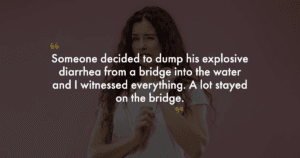Trigger warning: This Farticle talks about sexual assault. Viewer discretion is advised.
Sexual assault is the worst, most awful thing any human being can go through. Not only does it chip away your dignity, but it also makes you question your self-worth. At a gory time like this, when a friend or family does decide to confide in you, it’s important you take the matter seriously.
This Reddit thread reveals how you should respond if someone tells you they’ve been assaulted:
1. This is such a difficult topic. Personally, I would go with: “It’s terrible that happened to you. That must have been so scary.” If she wants to share more after this she will. As a survivor myself, I feel most comforted if someone acknowledges the hurt empathetically without asking lots of questions or trying to problem solve. – knotty-hooker73
2. “Thank you for sharing this with me” is another great part to add to your response. As a survivor myself, I don’t like sharing because it feels like dumping, but in your response, I think something along the lines of the above or “I’m glad you are talking about this” helps a lot to know it was worth sharing.” – intothespookyvoid
3. In addition, as a survivor, people who say things like “I’m going to kill them” or “You need to a, b, c, and d…” are not helping the situation. It actually takes away from the vulnerability and courage it took to say something in the first place. – Mighty_Millet
4. When I was being sexually harassed almost daily by the same guy in high school, my boyfriend at the time genuinely considered having his friend come jump him, and I begged him to not go to jail over it. at first, I really appreciated it because no one took it that seriously beside him and my best friend. and then it was all he’d talk about when I filled him in on the latest harassment scenario. felt less like he was worried about me and more about fulfilling a saviour complex. I explained how those threats made me feel eventually and why I never wanted to report/tell people about my abuser, and he apologized. He truly did care about me but the tendency of men running at the chance to commit excusable violence in the name of “defending their lady” smells funky to me these days. – Mommabear126
5. It frightens me when people get aggressive in response to you confiding in them. You recognise that they’re protective and/or posturing, but it puts you in the awkward and weird position of then feeling responsible for your abuser. I’m sure there are many women who wouldn’t shed a tear if their abuser came to harm, but I am a hard-core pacifist and Buddhist and therefore 100% against violence in all forms. I have explained this in the past about how one punch can kill, and violence begets violence, how as the wronged party I expect the right to choose how pissed off I am etc. but some people have felt it’s their manly duty to avenge me or whatever. I feel I have dealt with it in my own way (confronted the guy and got an apology) so any additional action would only hurt me further. TLDR: even lightheartedly suggesting violence in response to someone confiding abuse to you can unwittingly turn the victim into an unwilling protector. Don’t do it. – d3gu
6. Something along the lines of “I’m sorry” and then asking whether they want to talk about it would probably be good for any survivor, regardless of gender. Do NOT urge them to go to report it, unless they say they want to. That process can be nearly as traumatic as the assault itself. – peppermind
7. The first person I told about my assault didn’t comfort me or support me but instead tried to force my hand to report it to the police because it’s the “right thing to do”. Why is it the victim’s job to clean up this world? Something bad just happened to me and I’m still trying to fix myself. – SprinklesPristine248
8. “I’m so sorry that happened to you” “Thank you for trusting me” “You deserved so much better than that. I hope you know it wasn’t remotely your fault” “I’m here if you need a hug. I’m also here if you don’t want to be touched.” This last one can make a big difference. It tells her that you care, offers but doesn’t push for physical comfort (which could be seen as selfish) and prompts her to communicate her needs After she’s had a chance to cry or vent, suggest a nap, meal, or chill activity. If you are able to move forward like it’s no big deal, it helps reassure her that this doesn’t affect your view of her negatively. – Emu_with_attitude
9. Something that victims fear after telling their story is being seen as weaker or as someone who couldn’t take their rights, as someone defeated. If you have that look in your eye when the victim is telling you their story you are not the right person, and the victim will regret telling you. Talking as a survivor of a sexual assault, the last thing I want is for people to see me broken and pity me. – paranoid_in_nature
10. Along with what a lot of other people are saying here, if she wants to go more in depth, listen. I’ve experienced sexual abuse (kind of it’s complicated) and something I always wished people would do when I spoke about it was listen. I had a lot of friends who, when I would talk about what happened to me, would say things like “wow I hope he dies” or something along those lines. And there’s a place for those comments of course, and I will admit that I’ve participated in those jokes from time to time, but that wasn’t always the best thing to say to me in that moment. These people were well-meaning and wanted to support me, but in their efforts to try and make me feel better or to fight against how women are so often told to just get over it, they made me feel like I wasn’t allowed to experience all of the complex emotions I was feeling. Basically, you feel a lot of really complicated things after something like that happens, and it’s nice to have someone to listen. – afuckingwildcard
If you’ve been a victim of sexual assault please reach out to your family or seek professional help. Sexual assault helpline number: 8793088814
Top picks for you

















